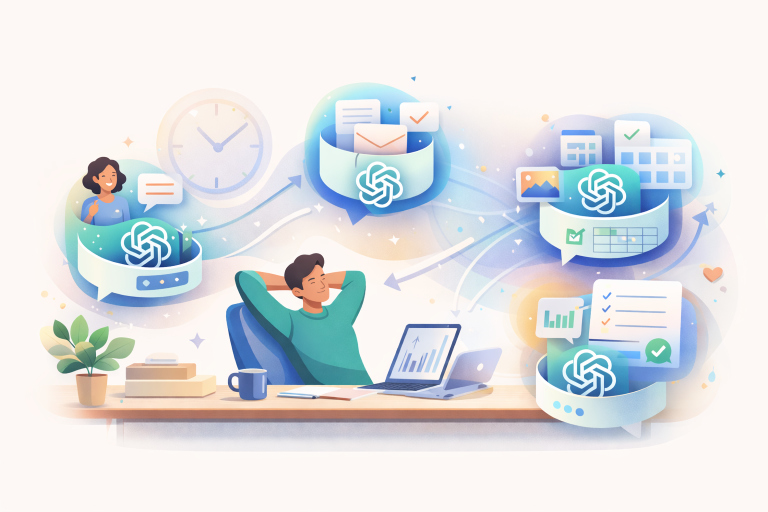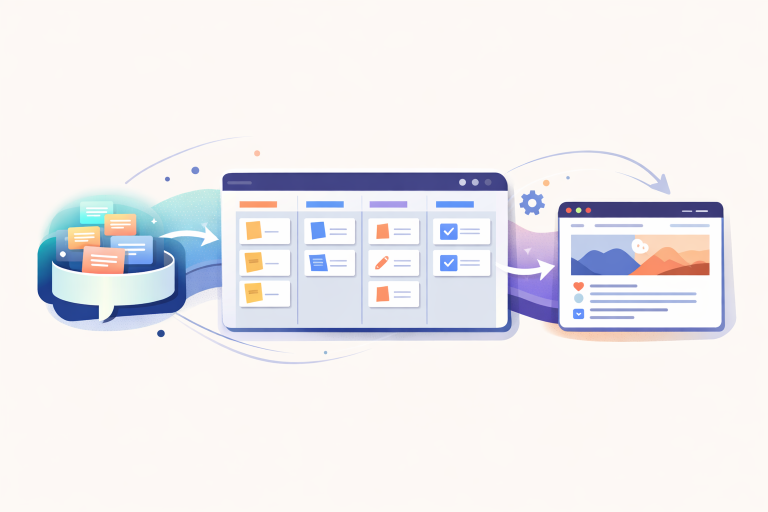In today’s fast-paced digital landscape, the demand for efficient, agile, and data-driven project management has never been higher. Traditional methods—while still valuable—often fall short in addressing the complexity and dynamic nature of modern projects. This is where Artificial Intelligence (AI) emerges as a transformative force.
Integrating AI into project management workflows is no longer a futuristic concept—it’s a competitive necessity. From automating routine tasks to forecasting project risks and enhancing team collaboration, AI offers a strategic edge that drives performance, accuracy, and decision-making.
This comprehensive guide explores the ultimate AI workflow for project management, offering a step-by-step framework that combines cutting-edge technology with real-world application. Whether you’re managing software development, marketing campaigns, or enterprise initiatives, leveraging AI can significantly streamline processes and boost project success rates.
In this post, you’ll learn:
- What AI in project management really means
- How to build an AI-powered workflow from planning to reporting
- The top AI tools transforming the project management space
- Practical insights for overcoming implementation challenges
Get ready to revolutionize your workflow with intelligent automation, predictive insights, and smarter resource allocation. Let’s dive into the future of project management—powered by AI.
Understanding AI in Project Management
To effectively implement an AI workflow for project management, it’s essential to first understand what AI truly brings to the table. At its core, Artificial Intelligence in project management refers to the use of intelligent algorithms and machine learning models to analyze data, automate tasks, and assist in decision-making processes.
Unlike traditional tools that rely heavily on manual input, AI-powered systems can assess project variables in real-time, predict outcomes, and provide actionable insights. These capabilities enable project managers to make faster, more informed decisions—ultimately reducing delays, resource waste, and budget overruns.
Key AI Technologies in Project Management
- Machine Learning (ML): Predicts project timelines, identifies potential risks, and recommends resource adjustments based on historical data.
- Natural Language Processing (NLP): Powers smart assistants and chatbots that automate communication, meeting summaries, and documentation.
- Predictive Analytics: Uses data models to forecast project success, budget consumption, and potential delays with impressive accuracy.
- Robotic Process Automation (RPA): Handles repetitive administrative tasks, freeing up teams to focus on strategic initiatives.
Why AI Matters in Project Workflows
Incorporating AI into your project management strategy isn’t just about adopting the latest tech—it’s about optimizing productivity and ensuring consistent project success. An AI-driven workflow improves team alignment, enhances transparency, and delivers deeper visibility into every phase of a project.
By utilizing an AI workflow for project management, organizations can:
- Streamline task delegation and workload balancing
- Minimize human error in complex planning scenarios
- Accelerate time-to-completion with intelligent scheduling
- Improve stakeholder communication with data-driven reporting
As we move into a new era of digital project execution, AI is no longer optional—it’s a critical enabler of agility, precision, and competitive advantage.
The AI-Powered Project Management Workflow
Implementing a successful AI workflow for project management requires a structured approach that blends intelligent tools with proven project methodologies. This section breaks down the AI-enhanced project management process into five key stages—each designed to improve efficiency, accuracy, and strategic decision-making.
Step 1: AI-Enhanced Planning & Goal Setting
The foundation of any project begins with strong planning. AI tools can analyze historical project data, industry benchmarks, and real-time variables to generate accurate task estimations and realistic deadlines.
- Smart Goal Creation: AI platforms suggest measurable and time-bound objectives using data from similar past projects.
- Timeline Forecasting: Predictive analytics help create achievable timelines, factoring in risks and dependencies.
- Risk Identification: Machine learning models flag potential bottlenecks before they arise, enabling proactive mitigation.
By starting your project with AI-driven insights, you establish a data-informed roadmap that minimizes uncertainty from the outset.
Step 2: Intelligent Task Allocation & Team Collaboration
One of the biggest challenges in project management is resource optimization. With an AI workflow for project management, task assignments become smarter and more efficient.
- Skill-Based Allocation: AI matches tasks to team members based on experience, availability, and performance history.
- Collaborative Tools: AI-enhanced platforms like ClickUp or Monday.com streamline communication, document sharing, and progress tracking.
- Virtual Assistants: AI chatbots and smart assistants can schedule meetings, answer FAQs, and provide real-time updates, keeping the team aligned.
This step improves productivity while ensuring workloads are balanced and transparent across departments.
Step 3: AI-Driven Execution & Automation
Execution is where the project plan meets reality. AI plays a pivotal role in ensuring the transition is seamless and efficient.
- Workflow Automation: Automate repetitive processes like task status updates, approval chains, and follow-ups.
- Performance Monitoring: AI continuously evaluates progress and flags deviations from the plan, allowing for immediate corrective action.
- Adaptive Scheduling: Real-time data triggers automatic updates to timelines and dependencies when scope or resources shift.
AI enables your project to run with fewer delays and greater consistency, all while reducing administrative overhead.
Step 4: Real-Time Monitoring & Risk Management
During execution, project conditions can change rapidly. AI helps project managers stay ahead of the curve with real-time monitoring and predictive risk control.
- Smart Dashboards: Visualize KPIs, milestones, and team workloads with AI-powered dashboards.
- Anomaly Detection: Algorithms detect unusual patterns in performance, budget, or delivery timelines.
- Proactive Mitigation: AI not only detects risks—it recommends actionable solutions to resolve them quickly.
With an AI-supported oversight system, your project remains agile and resilient.
Step 5: AI-Based Reporting & Continuous Improvement
The final step in the AI workflow for project management is generating insights and learning from outcomes.
- Automated Reports: Generate customized reports that summarize performance, ROI, and KPIs with minimal effort.
- Project Retrospectives: Use AI to identify what worked, what didn’t, and why.
- Continuous Optimization: Feed insights back into your AI models for better future predictions and planning.
AI closes the feedback loop, helping your organization grow smarter with every project completed.
By following these five stages, businesses can construct a resilient and scalable AI workflow for project management that adapts to change, reduces manual tasks, and improves decision-making at every level.
AI Tools for Project Management
Choosing the right technology is critical when building an effective AI workflow for project management. Today’s market offers a variety of AI-powered platforms designed to streamline planning, collaboration, automation, and reporting. These tools integrate seamlessly into existing workflows and help teams scale productivity without increasing complexity.
Below is a curated list of top-performing AI tools that project managers can leverage to create smarter, more adaptive workflows.
1. ClickUp
A comprehensive project management suite with strong AI integration.
- Key AI Features: Task suggestions, automated progress tracking, intelligent time management.
- Best For: Cross-functional teams needing an all-in-one platform with customizable workflows.
2. Monday.com
A flexible work OS enhanced with AI-driven automations.
- Key AI Features: Automated status updates, workload predictions, risk alerts.
- Best For: Visual project tracking and scalable automation across departments.
3. Asana
A user-friendly tool that leverages AI to simplify task management and team collaboration.
- Key AI Features: Natural language task creation, dependency detection, project forecasting.
- Best For: Agile teams and marketing operations looking for clarity and alignment.
4. Wrike
An enterprise-ready platform with advanced AI tools for project optimization.
- Key AI Features: AI-powered work intelligence, performance analytics, resource forecasting.
- Best For: Large organizations with complex, multi-team projects.
5. Notion AI
Combines project management with AI-assisted writing and task organization.
- Key AI Features: Automated meeting summaries, task generation, note-taking enhancements.
- Best For: Knowledge workers and startups looking for versatility and simplicity.
6. Trello + Butler AI
Trello’s Butler automation brings AI capabilities to its intuitive Kanban-style system.
- Key AI Features: Rule-based automation, smart triggers, auto-sorting of tasks.
- Best For: Visual thinkers and teams seeking lightweight, intuitive project tracking.
Choosing the Right AI Tool for Your Workflow
When selecting tools to support your AI workflow for project management, consider:
- Project complexity: Will the tool scale with your team and project scope?
- Integration capabilities: Does it connect with your existing tech stack (e.g., Slack, Google Workspace, Jira)?
- User-friendliness: Can your team adopt it quickly without extensive training?
- Customization: Does it allow flexibility to tailor workflows and automation rules?
The right platform will not only automate repetitive tasks—it will elevate your team’s ability to focus on strategic goals, collaboration, and innovation.
Challenges & Considerations When Implementing AI in Project Management
While the benefits of adopting an AI workflow for project management are substantial, the path to implementation isn’t without its hurdles. Integrating AI into existing workflows requires a thoughtful approach to change management, data strategy, and tool alignment.
Understanding these common challenges—and how to overcome them—will help ensure a smoother transition and maximize long-term ROI.
1. Resistance to Change
One of the most significant barriers to AI adoption is team hesitation or resistance. Employees may fear job displacement or feel overwhelmed by new technologies.
Solution:
- Communicate the role of AI as a support tool, not a replacement.
- Offer training programs and hands-on sessions to boost confidence.
- Involve team members early in the selection and implementation process.
2. Data Quality & Availability
AI systems thrive on data. Without accurate, well-structured data, AI insights may be unreliable or misleading.
Solution:
- Conduct a data audit before implementation.
- Standardize data collection and formatting across platforms.
- Use AI-ready tools that offer built-in data management and cleaning features.
3. Integration with Existing Systems
Many organizations already use legacy project management tools. Ensuring seamless integration between these systems and new AI-powered platforms can be complex.
Solution:
- Choose AI tools with robust API support and integration libraries.
- Start with a pilot program to identify potential friction points.
- Work with IT stakeholders to streamline platform compatibility.
4. Security & Privacy Concerns
AI systems often handle sensitive project data, including client information, budgets, and timelines. Data privacy and cybersecurity risks must be addressed proactively.
Solution:
- Implement end-to-end encryption and access controls.
- Choose AI vendors that are GDPR, HIPAA, or SOC 2 compliant (as applicable).
- Regularly audit systems for vulnerabilities and compliance gaps.
5. Unrealistic Expectations
AI is powerful, but it’s not magic. Overestimating its capabilities can lead to disappointment and misalignment with project goals.
Solution:
- Set clear, realistic objectives for AI integration.
- Focus on solving specific pain points (e.g., task automation, predictive scheduling).
- Continuously refine workflows based on performance data and team feedback.
Strategic Tips for a Smooth AI Implementation
- Start small: Pilot AI on a single project or department before scaling.
- Focus on impact: Prioritize areas where AI will drive measurable results.
- Review & adapt: Continuously monitor AI performance and adapt workflows accordingly.
By proactively addressing these challenges, organizations can unlock the full potential of an AI workflow for project management—boosting efficiency while empowering teams with smarter, data-backed decision-making.
AI-Based Reporting & Continuous Improvement
The final—and arguably most transformative—stage of an effective AI workflow for project management is harnessing data for continuous learning and improvement. Traditional reporting methods often lag behind project realities, but AI-driven insights provide real-time clarity, enabling teams to adapt faster and smarter.
AI doesn’t just help you finish a project—it helps you improve the next one.
1. Automated, Real-Time Reporting
Manual reports are time-consuming and error-prone. AI automates the entire reporting process, offering dashboards that update in real-time based on project data streams.
Benefits include:
- Instant access to KPIs, timelines, and budget status
- Customizable views for different stakeholders (e.g., C-suite vs. team leads)
- Reduction in administrative overhead and human error
By integrating intelligent reporting tools, project managers can shift their focus from collecting data to analyzing it.
2. Performance Analysis & Insight Generation
AI tools analyze patterns across past and current projects to highlight what worked—and what didn’t.
- Identify bottlenecks in workflow or communication
- Evaluate team productivity and resource utilization
- Uncover trends in project delays or cost overruns
These insights can then be used to adjust resource allocation, redefine project scopes, or improve planning in future cycles.
3. Smart Retrospectives & Knowledge Sharing
Post-project reviews are crucial for growth. AI enhances retrospectives by compiling detailed summaries, identifying anomalies, and generating recommendations for future action.
- AI-generated summaries of project outcomes and lessons learned
- Pattern recognition across multiple projects to inform strategic decisions
- Integration with knowledge bases to preserve and share learnings
This data-backed reflection turns every project into a source of strategic knowledge.
4. Continuous Optimization Through Machine Learning
A major advantage of incorporating AI is its ability to learn and improve over time. The more data your AI system processes, the better it becomes at forecasting, risk assessment, and resource planning.
- Predict future project success rates based on historical models
- Continuously adapt algorithms for improved performance
- Create a feedback loop that improves accuracy and efficiency with every project
This creates a powerful, self-improving system that evolves alongside your organization’s needs.
The AI Feedback Loop: A Strategic Asset
By closing the loop with automated reporting and optimization, an AI workflow for project management doesn’t just end when a project concludes—it feeds valuable insights back into the system. This enables your organization to innovate, refine, and outperform competitors with each iteration.
As organizations strive to improve efficiency, reduce waste, and stay competitive, adopting an AI workflow for project management is no longer a futuristic ideal—it’s a strategic imperative. From intelligent planning and automated execution to real-time monitoring and continuous improvement, AI is transforming how projects are managed across industries.
By leveraging the right tools, overcoming adoption barriers, and aligning AI capabilities with business goals, teams can unlock unprecedented productivity, precision, and agility. More than just a trend, AI offers a scalable solution for modern project challenges—one that learns, adapts, and evolves with every completed milestone.
Whether you’re a project manager, team lead, or executive, now is the time to evaluate how AI can enhance your workflows. Start small, measure impact, and scale confidently. The future of project management is here—and it’s powered by AI.
Ready to transform your workflow?
Explore the tools and strategies shared in this post to begin building your own AI-powered project management system today.
For More posts Please look here
For IT Consults please use the contact form








